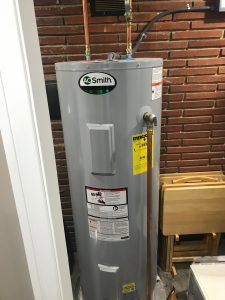Repairing Standard Water Heater Challenges
Repairing Standard Water Heater Challenges
Blog Article
They are making a few good points on the subject of Common Problems with Your Home Water Heater overall in this post directly below.

Picture beginning your day without your routine hot shower. That currently establishes a poor tone for the rest of your day.
Every house requires a reputable water heater, but only a few know how to take care of one. One very easy means to maintain your hot water heater in leading form is to look for faults on a regular basis as well as fix them as soon as they appear.
Bear in mind to switch off your hot water heater before sniffing about for mistakes. These are the water heater mistakes you are more than likely to come across.
Water too warm or as well cold
Every hot water heater has a thermostat that figures out how warm the water gets. If the water entering into your home is also warm regardless of setting a convenient maximum temperature level, your thermostat could be faulty.
On the other hand, also cold water might be due to a fallen short thermostat, a broken circuit, or inappropriate gas flow. For example, if you use a gas water heater with a busted pilot light, you would get cold water, even if the thermostat is in perfect condition. For electric heating systems, a blown fuse may be the wrongdoer.
Lukewarm water
Despite exactly how high you established the thermostat, you won't obtain any hot water out of a heater well past its prime. A water heater's efficiency may reduce with time.
You will additionally obtain warm water if your pipes have a cross connection. This means that when you activate a faucet, hot water from the heater flows in along with routine, cold water. A cross connection is very easy to area. If your hot water taps still follow shutting the hot water heater valves, you have a cross link.
Unusual noises
There are at least five kinds of sounds you can learn through a hot water heater, yet one of the most usual analysis is that it's time for the hot water heater to retire.
To start with, you must recognize with the normal appears a hot water heater makes. An electrical heating unit might seem various from a gas-powered one.
Popping or banging noises normally imply there is a piece of debris in your storage tanks, as well as it's time to cleanse it out. On the other hand, whistling or hissing noises might simply be your valves allowing some stress off.
Water leaks
Leakages could come from pipes, water links, shutoffs, or in the worst-case circumstance, the container itself. With time, water will wear away the container, and also locate its escape. If this takes place, you need to replace your water heater as soon as possible.
However, prior to your modification your entire tank, make sure that all pipelines remain in place which each valve functions perfectly. If you still require assistance identifying a leakage, call your plumber.
Rust-colored water
Rust-colored water implies among your water heater parts is rusted. Maybe the anode rod, or the container itself. Your plumber will have the ability to identify which it is.
Not enough warm water
Hot water heater come in lots of dimensions, relying on your hot water demands. If you run out of warm water before every person has actually had a bath, your water heater is too little for your family size. You ought to think about mounting a larger hot water heater tank or opting for a tankless hot water heater, which occupies less room as well as is extra sturdy.
Discoloured Water
Rust is a major source of filthy or discoloured water. Deterioration within the water tank or a falling short anode rod could cause this discolouration. The anode rod safeguards the tank from rusting on the within as well as ought to be checked annual. Without a rod or a properly operating anode rod, the warm water swiftly corrodes inside the container. Contact a specialist water heater technician to figure out if replacing the anode rod will certainly fix the issue; otherwise, replace your water heater.
Verdict
Preferably, your water heater can last ten years prior to you require a change. Nevertheless, after the 10-year mark, you might experience any one of these mistakes extra frequently. Now, you need to add a new water heater to your budget plan.
How To Troubleshoot 3 Common Water Heater Problems in Twin Cities
The Water Heater Is Leaking
A leaky cold water inlet valve A loose pipe fitting A leaky temperature and pressure relief valve A corroded anode rod A cracked tank Turn Off Your Water Heater:
Shut off your gas water heater by turning the gas valve on the unit to the “OFF” position. Shut off your electric water by switching its power off at your electrical panel. Look for a two-pole breaker labeled “water heater” and turn it to the “OFF” position. Move the ball valve connected to the water heater to be perpendicular to the piping at a 90° angle. Look for the Leak:
Depending on whether the water is coming from the tank's top or bottom, you’ll want to look for the leak in different locations.
If the leak comes from the top of the tank, carefully look for water escaping from the cold water inlet valve or loose pipe fittings. Rusted hot and cold water valves can have loose connections with the tank, with water leaking out of them.
https://mspplumbingheatingair.com/blog/how-to-troubleshoot-3-common-water-heater-problems
I hope you enjoyed reading our article about Common Problems with Your Home Water Heater. Thank you so much for taking a few minutes to browse our content. Enjoyed reading our blog? Please share it. Let other people discover it. Thank you for your time invested reading it.
Avoid further plumbing damage; call. Report this page